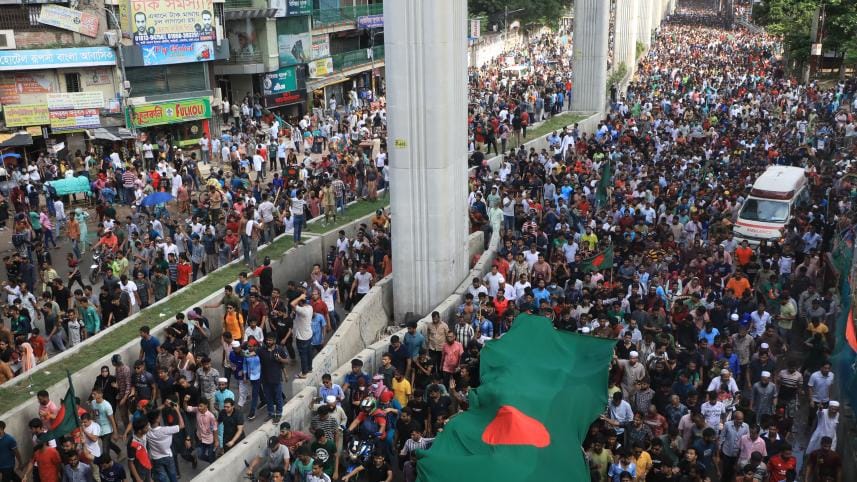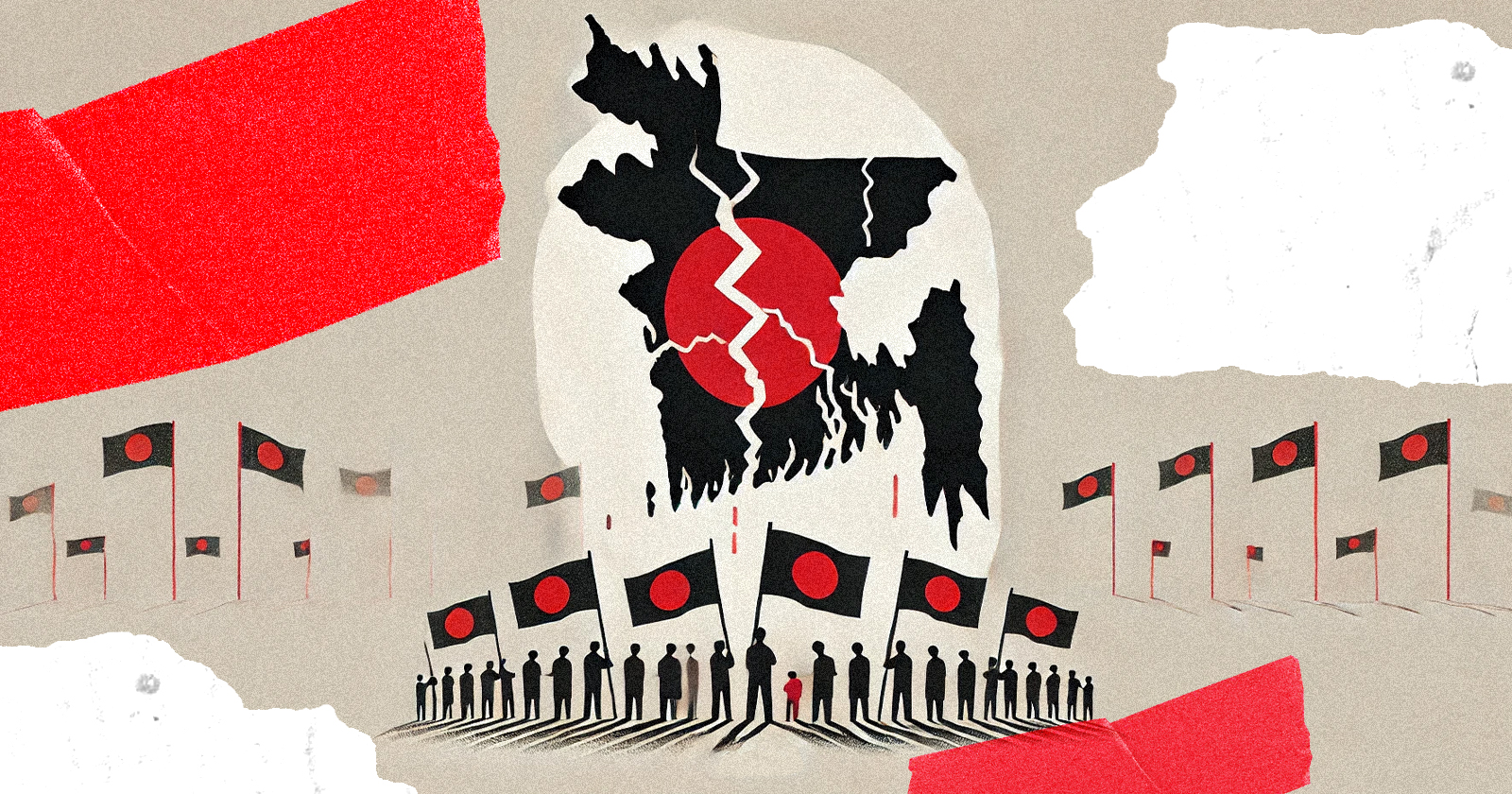New political settlement and the vision of a democratic state

More than four months have elapsed since the student and public uprising in July. During this time, the newly formed interim government has confronted numerous challenges and has often struggled to demonstrate tangible progress. Nevertheless, the government is resolutely laying the foundation for essential reforms across several critical sectors. Overall, Bangladesh is unmistakably moving forward through a significant transformation.
The July student and public uprising was a powerful call to abolish the fascist system and establish a new political settlement. This movement was not merely about replacing or overthrowing the rulers; it was about fundamentally transforming the system that enables state oppression of the people, rooted in specific socio-economic and political conditions. Nur Hossain bravely sacrificed his life to dismantle the military dictatorship of Ershad, driven by the conviction that democracy must be liberated. Despite establishing an electoral system in post-1990 Bangladesh, true democracy could not be achieved. Had democracy been genuinely realised, the sacrifices of individuals like Abu Sayed and Wasim Akram would have been unnecessary.
A critical issue in discussions about democracy in Bangladesh is the mistaken belief that elections equate to democracy. This prevailing narrative falsely asserts that holding elections is synonymous with being a democratic state. In reality, elections are merely a method for selecting a government for a specific period in a genuine democracy. If the state lacks fundamental democratic principles—such as the rule of law, institutional freedom, freedom of the press, freedom of speech and expression, and the right to assembly—then conducting elections every five years fails to establish true democracy.
In Bangladesh, we have decisively failed to establish a strong electoral system, severely undermining the continuity of elected governments. Numerous political parties have set a dangerous precedent by seizing power through elections but refusing to relinquish it at the end of their terms. This has created a cycle of coups, countercoups, military rule, a blatant disregard for democracy, and a pervasive culture of political violence.
It is evident that after each major historical event in our nation—specifically in 1947, 1971, and 1990—the resulting arrangements have consistently fallen short. The core issue is a glaring lack of a clear and unified vision for a democratic state. We must confront and resolve this fundamental problem if we are to advance effectively.
The call for the abolition of the fascist system and the establishment of a new political settlement during the 2024 uprising must be understood in its historical context. The post-uprising student movement, fiercely opposing inequality, along with the determined efforts of the National Citizens' Committee, is firmly rooted in this understanding. The National Citizens' Committee demands a new democratic constitution to ensure that no government can devolve into authoritarianism once in power. The 1972 constitution failed to deliver democracy and justice, ultimately paving the way for the oppressive one-party rule of the Baksal regime.
The student movement against inequality demands the declaration of a second republic. These demands from students and citizens cannot be ignored. Achieving fundamental change in our country requires more than just rushing into elections without necessary reforms. We firmly believe in the importance of elections as a core practice of democracy; however, we categorically oppose electioneering.
Electoral politics relentlessly seeks to maintain the status quo and obstruct essential reforms. In stark contrast, the movement to dismantle the fascist system is determined to eradicate the authoritarian elements entrenched within the state's structure. Our goal is clear: to establish true institutional democracy by creating a democratic constitution through an elected constituent assembly and conducting parliamentary elections under that constitution. This is the undeniable pathway of our democratic revolution.
This aspiration is not merely a romantic notion; it is a concrete vision grounded in global democratic principles. Our proposed vision for the state demands the establishment of a democratic constitution that unequivocally removes state institutions from executive control. We will implement decisive measures to limit the powers of the prime minister, preventing the rise of a singular authority.
We will unapologetically recognise the rights of all ethnic communities and prioritise the needs of minority groups. Ensuring a safe public space and achieving economic equality for women are non-negotiable imperatives. We reject the binary politics of religion versus culture and instead assert the necessity of building a cohesive political community through the integration of religion, language, history, and heritage within the framework of self-development.
Many researchers assert that Bangladesh's strategic geopolitical position commands the attention of both global and regional powers. Our geopolitical strategy is anchored in an unwavering commitment to protecting the sovereignty and territorial integrity of our nation. When it comes to foreign policy, we rigorously prioritise mutual interests and uphold our dignity.
Bangladesh will no longer be dismissed as a "bottomless basket." We've emerged as one of the world's rising economies, and it is clear that, had it not been for the extensive looting, rampant corruption, and money laundering of the past 15 years, our economy would rank among the foremost in Asia. We are resolute in our commitment to eradicating corruption and money laundering, creating abundant employment opportunities, offering special incentives to small and medium-sized enterprises, and transforming the tourism industry.
We will ensure that healthcare reaches every citizen, fully committed to the vision set forth by the late Dr Zafrullah. Our emerging political party, focused on engaging the youth, will prioritise increasing funding for education and promoting research and knowledge production. It's time to take bold action for the future of Bangladesh.
Criticism and dissent are vital pillars of democracy. We must unequivocally ensure that no government has the power to harass or torture individuals for their criticisms, nor can they engage in abhorrent acts such as enforced disappearances or imprisoning citizens without trial. It is imperative that we proactively prevent any recurrence of such egregious human rights violations. The recent extrajudicial killings have made it crystal clear that we will not tolerate these injustices. We cannot allow another life to be lost in this way.
The brutal actions of Sheikh Hasina and her party must remain etched in the public's memory. We will honour the martyrs with the utmost respect, and the injured will receive the highest standard of care. Their sacrifices and suffering will fuel the relentless reconstruction of Bangladesh.
We mustn't pit reform against elections. To establish a robust foundation for Bangladesh's democratic system, reform is not just necessary; it is unavoidable. The outcome of these reforms—free and fair elections—must restore our electoral democracy. We refuse to accept the loss of more lives merely for the sake of elections. The will of the people is unmistakably inscribed throughout the country. The message is clear: we demand reform in our nation, society, state, and institutions. While this reform process will not last indefinitely, the government must be given a defined period to deliver results. We must be vigilant to ensure that the urgent call for elections does not compromise the reform agenda. The government has no right to fail.Following these reforms, they must lay the groundwork for a new government to assume power within a strong and democratic framework, and that is our expectation. The youth will undoubtedly lead every sector of future Bangladesh.
Nasiruddin Patwary is the convener of the Jatiya Nagorik Committee.
Views expressed in this article are the author's own.
Follow The Daily Star Opinion on Facebook for the latest opinions, commentaries and analyses by experts and professionals. To contribute your article or letter to The Daily Star Opinion, see our guidelines for submission.




 For all latest news, follow The Daily Star's Google News channel.
For all latest news, follow The Daily Star's Google News channel. 

Comments